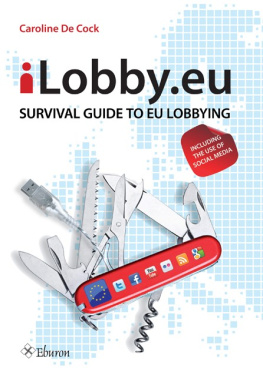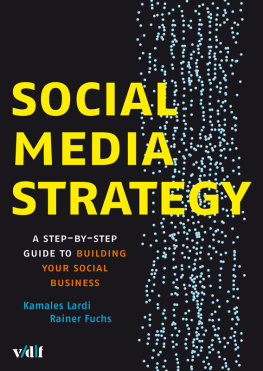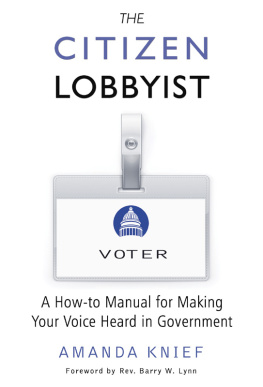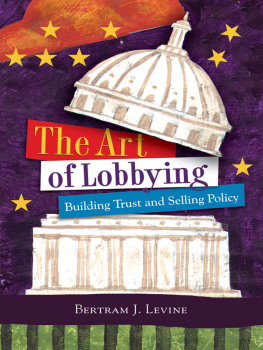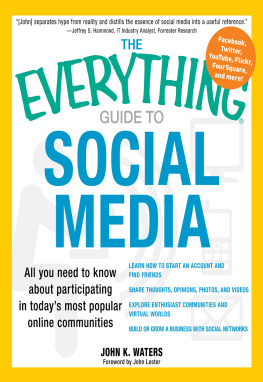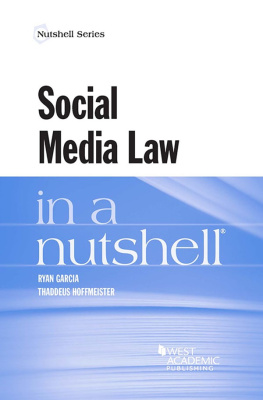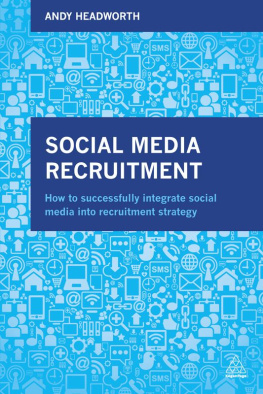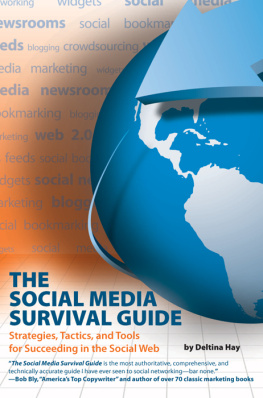
iLOBBY.EU
ISBN 978-90-5972-439-6 (paperback)
ISBN 978-90-5972-440-2 (ebook)
Eburon Academic Publishers
P/O Box 2867
2601 CW Delft
The Netherlands
Tel.: +31 (0)15 2131484 / Fax: +31 (0)15 2146888
info@eburon.nl / www.eburon.nl
Cover design: Textcetera
2010 CAROLINE DE COCK. All rights reserved. No part of this publication may be reproduced, stored in a retrieval system, or transmitted, in any form or by any means, electronic, mechanical, photocopying, recording, or otherwise, without the prior permission in writing from the proprietor.
T ABLE OF C ONTENTS
PREFACE
LOBBYING: CHESS OR SOMETHING ELSE?
Being a lobbyist is not an obvious career choice, even for a Belgian living a stone's throw away from Brussels.
I started my professional life as a lawyer in the only field I could find that did not already boast huge layers of dust on its related legal books: the Internet.
In the course of a decade, my curiosity and professional opportunities led me from the Big Four consulting world to a competition law firm and then to what insiders call the 'industry', i.e. big multinational telecommunications companies.
My passion for the Internet and technical matters which affect the daily lives of citizens and businesses around the globe has been the red thread in my career. What I enjoy the most as a lawyer is getting my head around technical and practical matters in order to raise the discussion to a different level. This has made me study late at night how websites are put together (even dabbing into PHP and HTML coding), just to be able to counter-argue when a webmaster or programmer would tell me one of my legally-motivated requests on a site was 'technically impossible' or too difficult. I did the same when it came to understanding how the Internet functions and annoyed more than one engineer by nagging them to show me places like 'Network Operation Centres' or opening pavements to see what fibre networks really looked like.
When I started as a freelance consultant, my main drive was to be able to pick and choose the issues I was going to work on something in-house regulatory departments and multi-consultancy firms rarely allow you to do.
For a long time, I didn't consider myself a lobbyist, what with being a lawyer whose serious business card read 'Regulatory Policy'. Moreover, the term lobbyist was extremely rare in Brussels, almost as if it had a dirty connotation: people would say they worked in EU affairs, PR, governmental relations, regulatory, compliance, think tanks... Anything except lobbying!
But a discussion with an American client made me realise that that was precisely what I was doing (and she claimed I was even good at it). I have since then decided to go beyond the negative connotation of the 'L word' and to carry the lobbying label with pride.
So, what exactly is lobbying? According to Wikipedia, "Lobbying is the practice of influencing decisions made by government (in groups or individually). It includes all attempts to influence legislators and officials, whether by other legislators, constituents, or organized groups. A lobbyist is a person who tries to influence legislation on behalf of a special interest or a member of a lobby."
I actually like this definition as it has the merit of recognising that lobbying is not only done by industry or trade associations, but by any organised group and even 'other legislators'. I am often amused when I see statements by bloggers or internet surfers saying: "Call your MEP to have law X change and fight against those nasty lobbyists!" Now, what exactly do they think they are encouraging others to do? It would certainly qualify as lobbying in my book.
When people, and in particular young students, ask what a lobbyist does, I compare the job to two things: marriage counselling and curling.
First, lobbyists are like marriage counsellors because their job involves listening, trying to understand how both sides see things and then subtly explaining why a specific perspective on a given issue should be preferred over another. The goal is to make everyone in the room feel like their views have been respected.
Secondly, while lobbying is often compared to a subtle game of chess, it actually has more in common with curling.
Imagine the following scene: Four players are awkwardly balancing on an ice skating rink lit only by bleak neon lights, somewhere in the middle of Canada. One of the men is holding a heavy-looking, polished oblong stone made of Scottish granite at arm's length. The aim of the game is to slide the heavy rock across the slippery frozen surface and get it to halt as close as possible to a bull's eye target marked on the ice. The thrower receives help from a teammate shouting instructions from behind the end line several dozen feet away. Two other players, known as sweepers, start to furiously rub the ice in front of the rock with broomsticks in order to smooth the path.
If you're a continental European, the whole process might look similar to the French lawn game known as ptanque or boules. North Americans are likely to be reminded of a giant shuffleboard game. To me, however, curling has an awful lot in common with lobbying.
Just like the curler, the European Commission tosses a piece of weighty, not very attractive-looking legislation out into the field, and all the stakeholders start brushing to blaze the way for the brainless object to end up exactly where they want it to go. Good strategies and sound collaboration are essential in defining the trajectory of your lobbying efforts, and the skills of individual players will determine how close you get to the desired result. And, at the end of the day, success depends not only on skills, sweat and brains, but also on an element of luck.
iLobby.eu sets out how to lobby the EU from the perspective of an actual lobbyist sharing her experiences and anecdotes. It also looks at the use of Web 2.0 / social networking tools in the area of lobbying and politics, by giving practical overviews, examples of worst and best practices, as well as recommendations for politicians, PR and e-communications professionals, lobbyists and campaigners of all sorts.
I decided to write this book after discovering that many of my clients, as well as students I met at various seminars, were unable to find an easily accessible source to understand the functioning of the European institutions.
Another catalyst were the very positive responses received from readers of my blog www.lobbyplanet.eu (ranked in the 2010 top 3 of Euroblogs by Bloggingportal, the largest portal of EU blogs) and Twitter feed @linotherhino (ranked in the 2009 top 3 of EU influential Twitterers). It never ceases to amaze me that so few of my European lobbyist colleagues have yet picked up on the power inherent to all these new social networking and information sharing tools. Although they don't replace the 'old methods' of lobbying, they add essential new ways of interacting and gathering intelligence. Ignoring them could be detrimental to your business.
My book is aimed at lobbyists, activists, think thanks, journalists, students of political and social sciences, business administration or law, and anyone interested in understanding the way EU decision-making works and how lobbying is changing under the influence of social media. But it is a valuable source for business people with activities in Europe who wish to understand what their company should consider before hiring a lobbyist or devising its lobbying strategy.
As an avid EU lobbyist, I have had to learn the process through trial and error. There have been funny and even touching moments in my career, but also equally painful bruises (mostly to my ego). This book should go some way to show you the way to constructive lobbying and the successful use of social media and avoid pitfalls on the way there.
Next page
